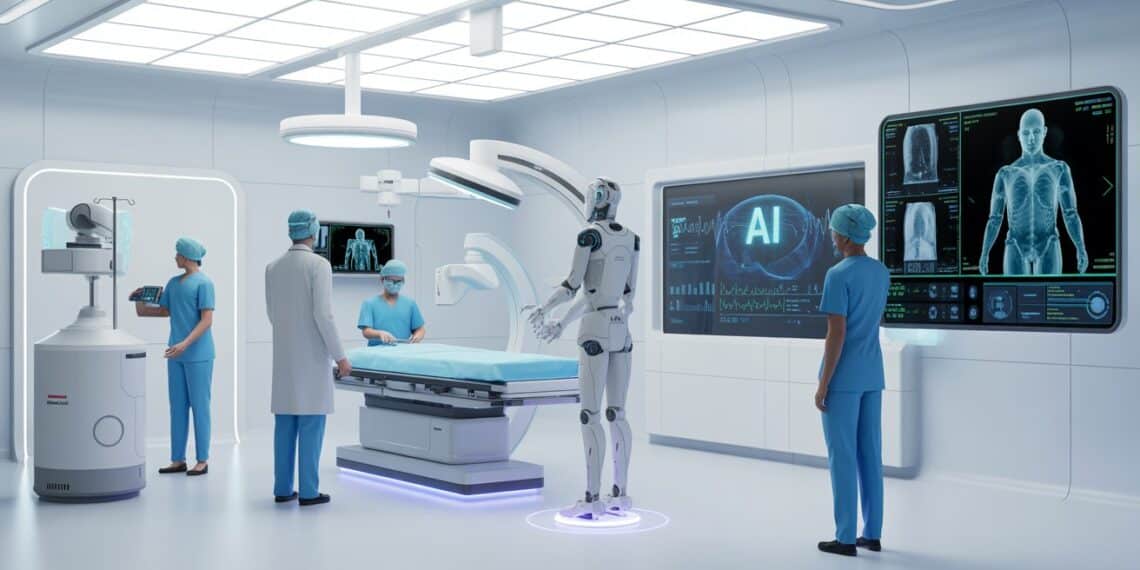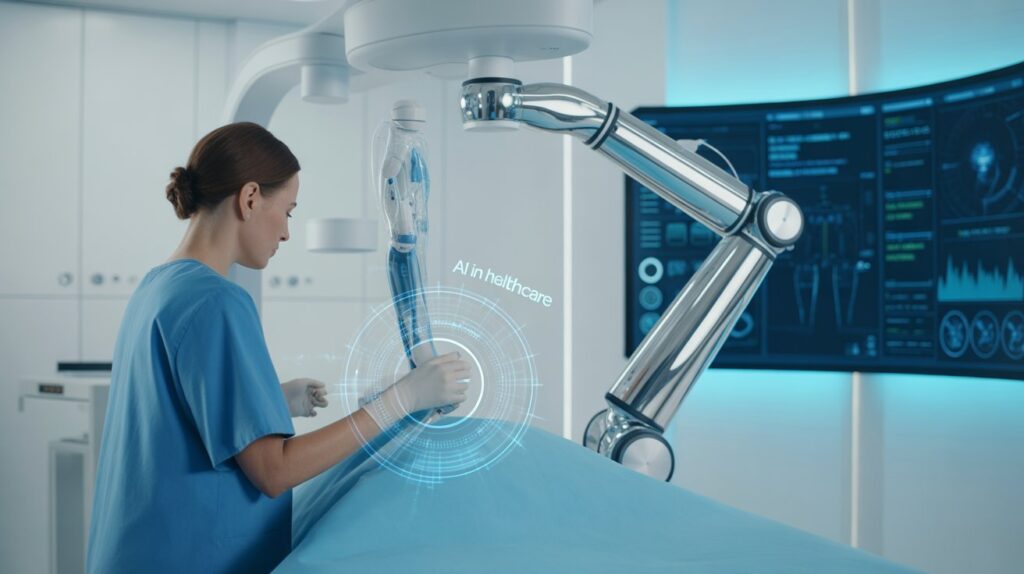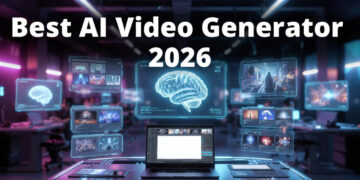Artificial intelligence (AI) has moved beyond experimental trials and research labs to become an integral part of modern healthcare. From medical imaging to drug discovery, predictive analytics to patient engagement, AI is transforming how healthcare systems operate and how patients receive care. This article explores AI in Healthcare: Real-World Applications, providing a detailed look at current use cases, benefits, challenges, and future trends shaping the industry.
AI’s influence on healthcare is not only reshaping the way clinicians diagnose and treat patients, but it is also redefining the administrative, financial, and research functions within health systems. Whether it’s enabling faster decision-making in emergency rooms or helping researchers analyze millions of genetic markers, AI is a catalyst for both clinical excellence and operational efficiency.
What Is AI in Healthcare?
AI in healthcare refers to the use of machine learning, natural language processing, computer vision, and other AI technologies to improve medical care, administrative processes, and research outcomes. It includes predictive modeling, clinical decision support, automated diagnostics, generative AI for medical content, and robotic process automation (RPA). These technologies enable clinicians to deliver faster, more accurate, and more personalized care while reducing costs and inefficiencies.
Unlike traditional rule-based systems, AI leverages vast datasets to continuously learn and improve. This adaptability allows it to handle complex and dynamic medical scenarios—from interpreting subtle patterns in imaging scans to suggesting individualized treatment regimens.
Why AI Matters in Healthcare
- Improved diagnostic accuracy: AI can analyze large datasets and medical images more precisely than the human eye, supporting faster detection of diseases.
- Operational efficiency: Automation reduces administrative burdens, freeing healthcare professionals to focus on patient care.
- Scalable care delivery: AI-powered tools allow care to reach underserved or remote populations through telemedicine and virtual health assistants.
- Personalized medicine: AI can tailor treatments based on individual genetic, lifestyle, and clinical data.
- Cost reduction: By minimizing errors and optimizing processes, AI helps lower overall healthcare expenditures.
- Enhanced patient experience: AI-powered tools offer 24/7 support, seamless scheduling, and real-time answers to patient queries.
Types of AI Technologies in Healthcare
Machine Learning (ML)
Machine learning algorithms detect patterns in large data sets. In healthcare, ML is used for predictive analytics, clinical risk assessment, and disease forecasting. Hospitals use ML to identify patients at high risk of readmission and to predict potential complications after surgery.
Deep Learning (DL)
Deep learning models excel at image recognition and natural language understanding. They power diagnostic imaging tools, such as those used in radiology, cardiology, and pathology. DL systems are trained on millions of medical images, enabling them to spot early signs of diseases like cancer or Alzheimer’s.
Natural Language Processing (NLP)
NLP enables machines to interpret unstructured clinical notes, research articles, and patient records. Doctors’ notes, discharge summaries, and pathology reports contain valuable information that is often difficult to extract manually. NLP tools allow clinicians to quickly access critical insights for improved patient care.
Computer Vision
Computer vision algorithms analyze medical images, X-rays, CT scans, and MRIs to detect abnormalities with high accuracy. Beyond diagnostics, computer vision is being used in surgical navigation and monitoring wound healing through smartphone cameras.
Generative AI
Generative AI creates new content, such as synthetic medical images, predictive models, and patient education materials. It supports drug discovery, training simulations, and clinical trial design. For example, generative AI can simulate rare disease cases to train doctors who might never encounter such conditions in real practice.
Robotic Process Automation (RPA)
RPA automates repetitive administrative tasks such as appointment scheduling, claims processing, and billing, improving efficiency across healthcare organizations. This reduces paperwork for staff, speeds up reimbursements, and minimizes human error.
Real-World Applications of AI in Healthcare
AI in Medical Imaging
AI tools now assist radiologists in detecting lung nodules, breast cancer, strokes, and other critical conditions. For example, deep learning algorithms can identify tumors in mammograms earlier than traditional screenings, improving survival rates. AI also reduces radiologist fatigue by pre-screening scans and flagging potential abnormalities.
Predictive Analytics and Early Diagnosis
Hospitals use predictive models to identify patients at risk of sepsis, cardiac arrest, or hospital readmission. AI-driven tools such as COMPOSER at UC San Diego have reduced sepsis-related mortality by predicting onset hours before clinical symptoms appear. Predictive analytics can also forecast seasonal disease outbreaks like influenza.
AI in Surgery
Robotic-assisted surgeries use AI algorithms for precision, reducing complications and recovery time. AI also helps surgeons plan complex procedures by simulating patient-specific surgical outcomes. In orthopedics, AI-powered robots guide joint replacements with unmatched accuracy.
Drug Discovery and Development
AI accelerates drug discovery by analyzing molecular structures and predicting how new compounds will interact with biological targets. Notable cases include the identification of novel antibiotics using machine learning at MIT and McMaster University. Pharmaceutical companies are saving years in research timelines thanks to AI-driven platforms.
Virtual Assistants and Chatbots
AI-powered chatbots support patient engagement by answering common health questions, providing medication reminders, and guiding symptom assessments. Virtual assistants help reduce call center loads and improve patient satisfaction. Some systems even provide emotional support for mental health therapy.
Administrative Automation
AI streamlines back-office operations such as medical coding, claims processing, and appointment management. By automating routine tasks, healthcare providers reduce costs and minimize errors. This allows staff to dedicate more time to direct patient interaction.
Personalized Treatment and Precision Medicine
AI integrates genomic data with patient history to suggest personalized treatments. Oncology care, in particular, has seen major breakthroughs in precision medicine powered by AI-driven genetic analysis. This reduces trial-and-error in drug prescriptions and improves patient outcomes.
Generative AI for Training and Simulation
Medical schools and training centers use generative AI to create virtual simulations for surgical training, patient interaction scenarios, and rare disease cases. This allows students to practice safely in a controlled, realistic environment.
AI in Mental Health
Natural language models analyze speech and text for signs of depression, anxiety, and cognitive decline. AI-based platforms provide early screening and remote therapy options. Digital platforms are increasingly being used to deliver accessible, cost-effective mental health support.
Remote Patient Monitoring
Wearables and connected devices powered by AI track vital signs such as heart rate, oxygen saturation, and glucose levels. These tools allow doctors to monitor patients with chronic conditions in real time, reducing emergency hospital visits.
Case Studies of AI in Action
- NHS (UK): Implemented AI-based chest X-ray analysis tool (qXR), achieving 99% accuracy in detecting tuberculosis and pneumonia.
- Semmelweis University (Hungary): Uses AI to predict hospital readmission risks, improving resource allocation and patient management.
- Stanford Medicine (USA): Developed ChatEHR, an AI system that transcribes and organizes doctor-patient conversations directly into the EHR, saving physicians hours of documentation time.
- MIT & McMaster University: Discovered new antibiotic molecule (abaucin) through AI-driven drug discovery, potentially addressing the global threat of antibiotic resistance.
Benefits of AI in Healthcare
- Enhanced diagnostic accuracy and speed.
- Reduced mortality rates through early intervention.
- Lower healthcare costs by optimizing workflows.
- Expanded access to care via telehealth and AI chatbots.
- Better patient experiences through personalized engagement.
- Improved workforce productivity and reduced burnout among clinicians.
Challenges and Limitations
Data Privacy and Security
Healthcare data is highly sensitive. AI systems must comply with HIPAA, GDPR, and other privacy regulations. Data breaches can undermine patient trust and pose legal challenges.
Integration with Existing Systems
Legacy electronic health record systems often struggle to integrate AI tools, causing workflow disruptions. Hospitals need interoperable platforms to maximize AI benefits.
Ethical and Regulatory Concerns
Bias in algorithms can lead to unequal care delivery. Regulatory bodies are still adapting to AI’s rapid growth, and frameworks for validation and approval are evolving.
Trust and Adoption
Clinicians may hesitate to rely on AI recommendations without clear transparency in how algorithms make decisions. Building trust requires explainable AI that provides interpretable outputs.
High Implementation Costs
While AI reduces costs in the long term, the initial investment in infrastructure, training, and technology can be prohibitive for smaller healthcare providers.
Future of AI in Healthcare
- Market Growth: The global AI in healthcare market is projected to grow at a CAGR above 35% over the next decade, reflecting massive investment and adoption.
- Expanded Use of Generative AI: Beyond administrative support, generative AI will drive advances in diagnostics, treatment design, and clinical trials.
- Remote Monitoring and Telehealth: Wearables and AI-driven virtual care platforms will enable proactive healthcare outside clinical settings.
FAQs on AI in Healthcare: Real-World Applications
Q1. What is the role of AI in healthcare today?
AI supports clinicians in diagnosing diseases, predicting risks, managing administrative tasks, and improving patient engagement. It is already being used in radiology, oncology, surgery, and drug discovery.
Q2. Can AI completely replace doctors?
No. AI is a support tool, not a substitute. It enhances decision-making, reduces workloads, and provides insights, but human expertise and empathy remain essential.
Q3. How is AI improving patient safety?
AI tools detect diseases earlier, reduce diagnostic errors, and monitor patients in real time using wearable devices. This leads to faster interventions and improved outcomes.
Q4. What are the main benefits of AI for healthcare providers?
Providers gain efficiency, reduced costs, streamlined workflows, and improved accuracy in both clinical and administrative tasks.
Q5. What challenges does AI face in healthcare?
Key challenges include data privacy, integration with existing electronic health records, regulatory compliance, high costs, and physician trust in AI systems.
Q6. How does AI help in drug discovery?
AI analyzes molecular structures and predicts interactions with human cells, drastically reducing the time and cost required to develop new medicines.
Q7. What is the future of AI in healthcare?
The future includes personalized treatments, AI-assisted surgeries, global telehealth expansion, and deeper integration with genomics and wearable technology.
Conclusion
Artificial intelligence has transitioned from theory to practice, shaping healthcare delivery in profound ways. The examination of AI in Healthcare: Real-World Applications shows that it is no longer an emerging trend but a critical component of modern medicine. From early disease detection to precision surgery and patient-centered care, AI is revolutionizing every corner of healthcare.
Yet, this transformation is not without its hurdles. Data security, ethical governance, integration challenges, and equitable access remain pressing issues. To maximize AI’s potential, healthcare leaders, governments, and technology developers must work together to ensure responsible and transparent use.
The future of healthcare lies in collaboration—where human intelligence and compassion are strengthened by AI’s speed, scale, and precision. If adopted thoughtfully, AI promises a healthcare system that is more efficient, equitable, and centered on patient well-being.











